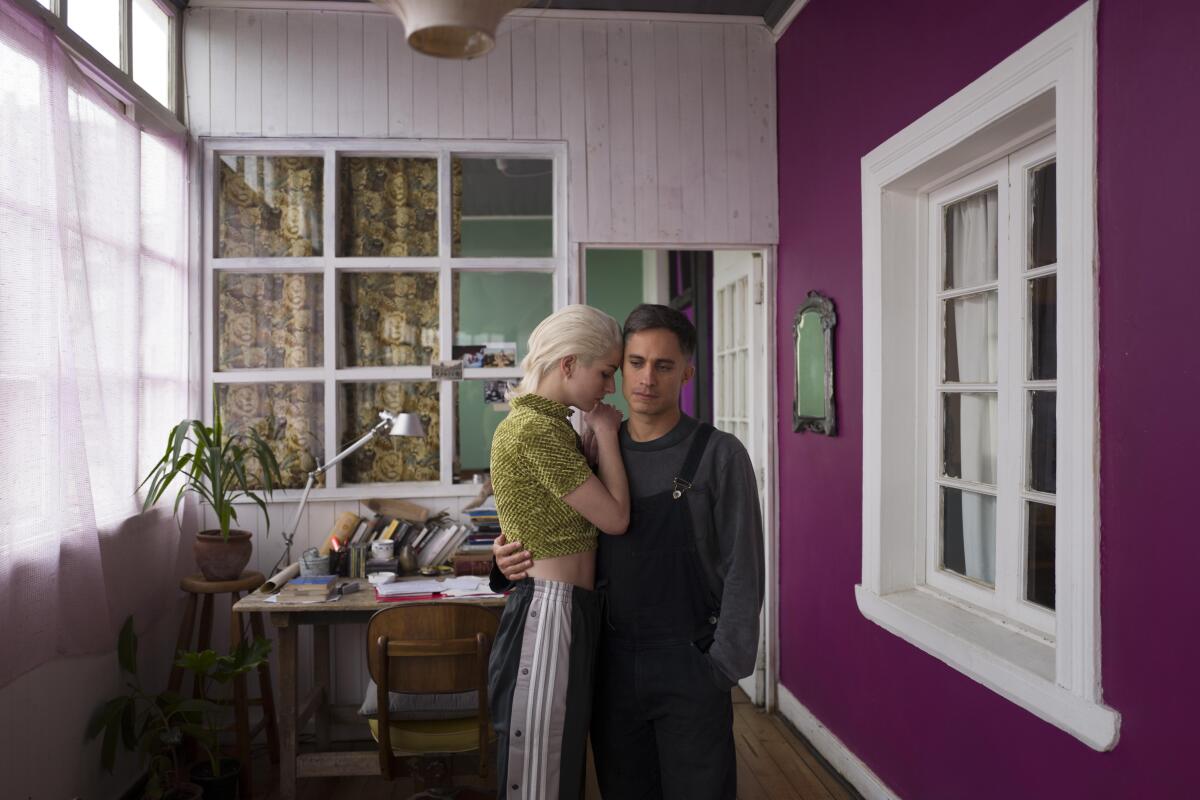Review: Pablo Larraín’s ‘Ema’ puts a fiery, Reggaeton-fueled spin on motherhood

The Times is committed to reviewing theatrical film releases during the COVID-19 pandemic. Because moviegoing carries risks during this time, we remind readers to follow health and safety guidelines as outlined by the Centers for Disease Control and Prevention and local health officials.
Pablo Larraín’s “Ema” opens with a vividly surreal image: a stoplight burns against a pre-dawn sky. It’s the first of many quotidian items, including statues, tire swings and cars, that will be set ablaze around the city of Valparaiso, Chile, as the platinum-haired, flamethrower-equipped Ema (Mariana Di Girolamo) retreats from these scenes, expressionless and enigmatic.
The film’s narrative, a darkly sensual fable of motherhood and the modern family, is also imbued with a sense of the surreal. It opens with an extended montage introducing the puzzling quandary with which the film is concerned. Ema, a dancer, and her husband Gastón (Gael García Bernal), a choreographer 12 years her senior, have recently been relieved of their adopted son, Polo, after an arson incident that resulted in the horrific disfigurement of Ema’s sister. The questions of where Polo is now, whether or not Ema and Gastón “gave him back,” and who is to blame in this ugly situation roils the tension between the couple. This opening salvo of interpersonal conflict is set against one of Gastón’s modern dance pieces, in which bodies rhythmically pulsate to the beat of composer Nicolas Jaar’s Caribbean-inflected score, backlit by glowing red and blue orbs.
Ema and Gastón blame each other and everyone but themselves for the situation with Polo, and their relationship turns sour, resentful and nasty as they hurl verbal torment at each other: she’s a bad mom, he’s sterile. The resentment permeates their creative collaboration too. Ema’s passion is street dance, not modern — reggaeton to be specific — which she indulges in with her uber-hip and slightly menacing girl gang of friends from the dance company. Clad in mix-and-match streetwear, they gyrate their hips almost hypnotically on basketball courts, in Valparaiso’s funiculars and on rooftops at night.
As the fissures in her marriage deepen, Ema acts out and shatters it completely, fueled by sex and fire. She sets a car ablaze with her napalm flamethrower without breaking a sweat and then seduces the firefighter, Aníbal (Santiago Cabrera), she and her girlfriends menacing him with their flirtatious advances. She seduces everyone she comes into contact with, including her divorce lawyer and girlfriends, seemingly as manipulation but also as a way of seeking abandon, her insatiable libido driven by her dance and her pyromania.
Our protagonist is at times an inexplicable puzzle box. She’s unpredictable and the film doesn’t allow us access to her thought process or even emotional state, so it feels like we’re constantly one step behind her. But she’s so calm and collected as she lights her life on fire that it seems to have an unknown internal logic behind it, a logic that only reveals itself at the end as all the pieces snap into place, the narrative layers slowly peeled away in a shocking, but not surprising, denouement.
“Ema” isn’t so much a character study as it is an exercise in keeping up with an abstruse yet undeniably fascinating figure. Di Girolamo is riveting, possessed of an intense physicality and a sly smile that conceals more than it reveals, drawing in her prey. Larraín crafts a mesmerizing cinematic rhythm that alternates between montage and slow camera movements; the film’s push-pull tempo mimics that of Ema’s own intimate machinations.
When the smoke has cleared, it seems that what Larraín uses “Ema” to express is an undeniable and primordial truth, despite the strange, circuitous and surreal way he gets there: The bond between a mother and her child is the strongest force in the universe. Interfere and you might get burned.
‘Ema’
In Spanish with English subtitles
Rated: R, for strong sexual content, nudity and language
Running time: 1 hour 47 minutes
Playing: Landmark Nuart, West L.A.
More to Read
Only good movies
Get the Indie Focus newsletter, Mark Olsen's weekly guide to the world of cinema.
You may occasionally receive promotional content from the Los Angeles Times.










